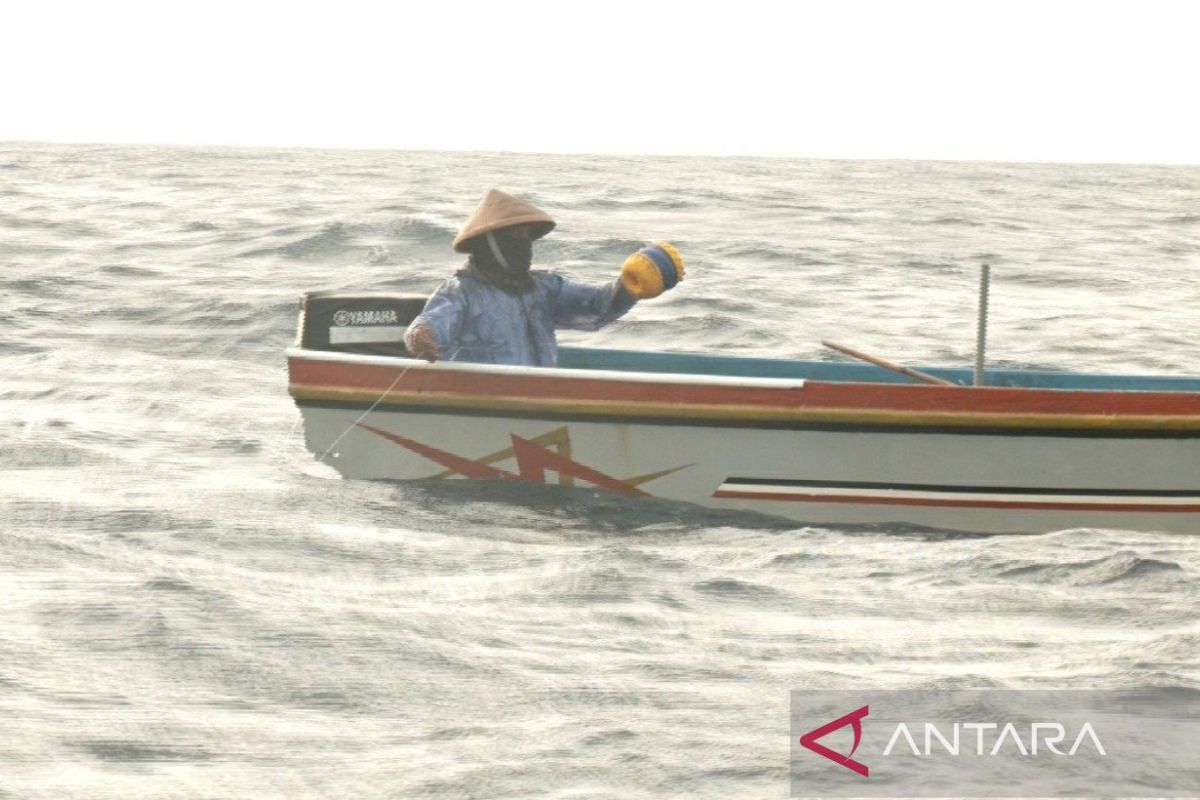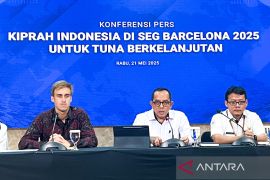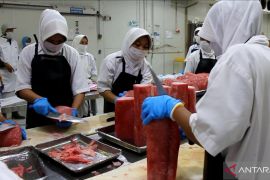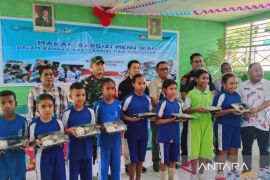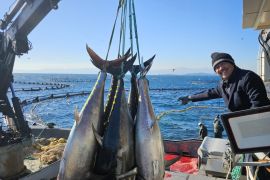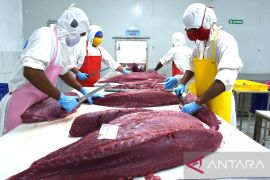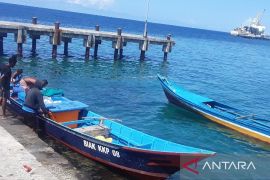Early on a recent morning, Tanjung Air Panas fishermen encountered winds strong enough to make the rolling waves crash powerfully against their hamlet's shores.
Life, however, must go on. Instead of surrendering to the weather, many of them lowered their boats and went out to the sea to make a living for their families.
This time, many of the handline fishermen of Tanjung Air Panas, which is situated about 25 kilometers away from Ambon, the capital of Maluku province, were aiming to catch prawns along the shoreline with the help of forehead flashlights.
For them, hunting shrimp was safer than catching yellowfin tuna in the middle of the sea.
Unlike them, La Irfan, 44, who leads a group of fishermen in the hamlet, felt confident about conquering the Maluku waters amid the unfriendly weather.
Therefore, he decided to go fishing for yellowfin tuna, something the bad weather prevented other fishermen from taking up.
Traditionally, local tuna fishermen would be encouraged to venture into the sea and fish for yellowfin tuna if one of their friends managed to do so successfully.
To go catch tuna in the middle of the sea, each fisherman requires about 60 liters of fuel and sufficient food.
Irfan, who was keen to try his luck, prepared to fish soon after the call for Subuh (dawn prayer) at his hamlet's house of worship.
He was not the only one to walk to the beach on his motorboat that morning. Three other fishermen, also his neighbors, followed him.
Each boarded his own motorboat, measuring about 7.5 meters in length and one meter in width, with their handlines and plastic fishing kites.
After cruising for about an hour or two, Irfan and his colleagues stopped their motorboats, miles away from the hamlet's coastal line. They then took out their squid jigs to use as bait to catch squid.
The squids they would catch would serve as bait for tuna. About 30 minutes in, they managed to catch enough squid. So, they started their engines to look for a fishing spot.
One of the best ways to identify potential tuna fishing spots is to look for a pod of dolphins and follow them as dolphins and tunas eat small fish, Irfan explained.
After finding one such spot, Irfan and the three other tuna fishermen stopped their motorboats and prepared to fish.
Irfan took a squid he had caught earlier and tied it to a stone the size of an adult fist using his handline. He did it again and again several times, but none of the tunas took the bait.
Irfan did not give up. He switched to another, more eco-friendly fishing method using the plastic kite he had prepared on the motorboat. But, again, his endeavor was unsuccessful.
Finally, Irfan and his colleagues decided to return home empty-handed at 10 a.m. local time.
During the tuna season, Irfan and many other tuna fishermen bring up to five tunas using their simple and eco-friendly fishing methods.
MS Certification
Thirty-three handline fishermen from Tanjung Air Panas hamlet in Tulehu village, Salahutu sub-district, Central Maluku district, have been certified by the Marine Stewardship Council (MSC) for the past three years, thanks to the Indonesian Pole and Line and Handline Association's (AP2HI's) accompaniment program.
AP2HI's fisheries manager, Herman, said that in the first stage of the program, the fishermen refused to adopt the sustainable fishing standard as they thought that it would make fishing difficult.
The association did not give up. Instead, the AP2HI persistently continued its accompaniment efforts by employing a local resident to help approach the fishermen, he said.
In the end, the fishermen were convinced and accepted the MSC principles and criteria for sustainable fishing, which enabled them to benefit greatly in terms of market access and stable prices.
Handline fishermen could even enjoy premium prices as their catches were sold in global markets, such as Europe and America.
According to Herman, the Maritime Affairs and Fisheries Ministry also put Tanjung Air Panas on the list of Indonesia's developed fishing villages in 2023.
The achievement has changed the hamlet's image from a slum area into a clean, beautiful, and attractive destination for people to visit. The hamlet now has a meeting hall for local fishermen.
For AP2HI and its close partner, the International Pole and Line Foundation (IPNLF), the MSC certification for yellowfin and skipjack tuna obtained by the Tanjung Air Panas fishermen is a big achievement.
The MSC certification would hopefully enhance small-scale fisheries' long-lasting collaboration with fishery industries, he said. Meanwhile, the AP2HI's Fisheries Improvement Project (FIP) with the IPNLF could help Indonesia's fisheries get managed sustainably, Herman added.
With regard to the Marine Stewardship Council's role in resolving global overfishing problems, he said that the MSC has pushed resolutions over the past two decades through the certification and eco-labeling programs to change people's behavior when purchasing seafood.
To achieve its goals, the MSC is maintaining international partnerships with such stakeholders as scientists, non-governmental organizations, fisheries regulators, fishery industries, retailers, and restaurants to ensure the sustainability of natural and delicious seafood products, he added.
In Indonesia, the MSC is collaborating with the Maritime Affairs and Fisheries Ministry and other related stakeholders and continuing to develop the FIP.
Herman further explained that the MSC certification and eco-labeling program is aimed at recognizing and appreciating sustainable fishing practices and helping create sustainable seafood markets.
In this regard, the MSC has continued its endeavors to stop overfishing, restore fish stocks, maintain the ecosystem, and reduce illegal, unreported, and unregulated (IIU) fishing, he informed.
Therefore, the MSC certification and eco-labeling program are essential for a country to enable it to maintain sustainable fishing and open market access globally, as well as compete with other countries.
The MSC program has also assisted certified fishermen to benefit greatly from increases in export demands and get more stable and better selling prices for seafood products sold globally, he said.
In addition, the MSC certification and eco-labelling program, which ensures better traceability from hook to plate, also helps improve partnering companies' awareness of the importance of preserving the oceans for future generations, Herman said.
This would hopefully make partnering enterprises aware of not only sustainable products and environmental protection but also the rights, welfare, health, and safety of many people, including fishermen and employees, he added.
This is an ideal condition that would support the sustainability of both fishing industries' and fishermen's activities, as well as the protection of the environment and the improvement of the welfare of those involved in the fisheries sector, he said.
Tuna Production
Given the fact that Indonesia is the world's largest archipelagic state with huge fisheries potential, the Marine Stewardship Council is paying serious attention to the country.
This seriousness was reflected in its signing a memorandum of understanding with the Maritime Affairs and Fisheries Ministry in 2019 and extending the MoU in 2022, he informed.
Since then, the MSC has implemented its programs in the country to ensure the positive impacts of sustainable fisheries on people's welfare as well as the country's ecosystem sustainability and foreign exchange.
Regarding Indonesia's tuna production, the ministry's director general for marine and fisheries product competitiveness, Budi Sulistiyo, said that it has shown a positive trend over the past few years.
Indonesia's tuna production was recorded at 229,481 tons in 2017, and it rose to 343,393 tons in 2021, surpassing Japan's at 137,685 tons in the same year.
The continued increases in tuna production in 2017–2021 have made Indonesia a global leader, he said, adding that the global tuna fish markets remain open and highly valued.
The markets include the United States of America, Spain, Italy, France, Germany, Canada, and the Netherlands, Sulistiyo highlighted, adding that the global tuna fish market was valued at US$15.64 billion in 2018 and US$16.81 billion in 2022.
For the Tanjung Air Panas fishermen who have been certified by the MSC, the high value of the global tuna fish market is indeed favorable, as they can also benefit from the market's positive trend and sustainable fishing rules.
Related news: The shift from mining to fisheries sector for Papuans' welfare: Govt
Related news: Fishery offices urged to partner with universities for fish feed study
Translator: M.Fikri S, Rahmad Nasution
Editor: Anton Santoso
Copyright © ANTARA 2024
